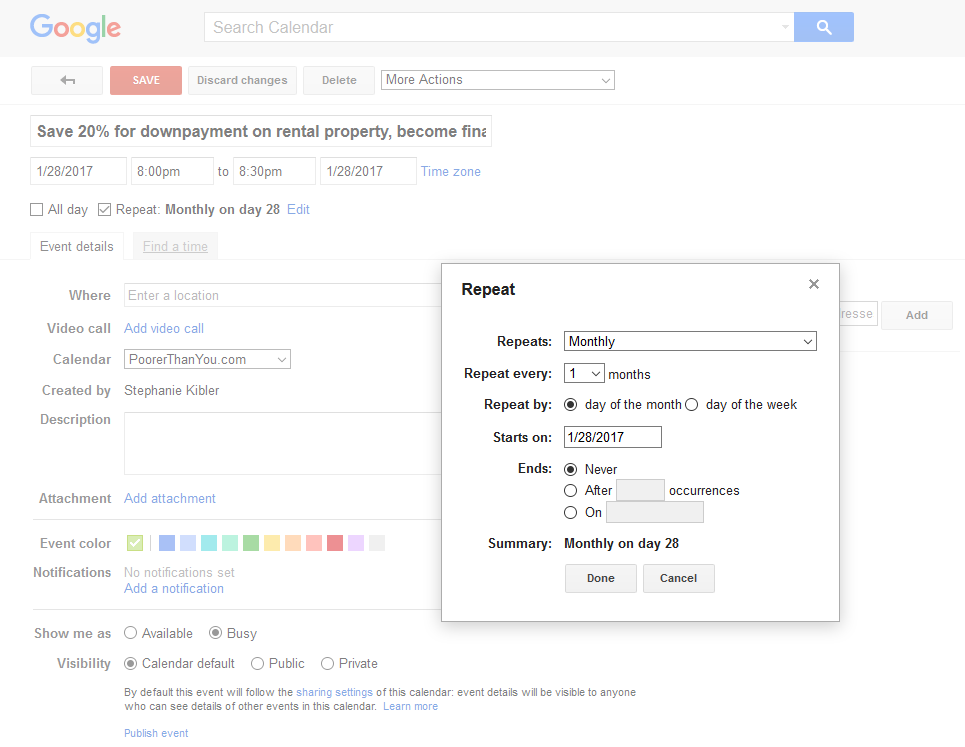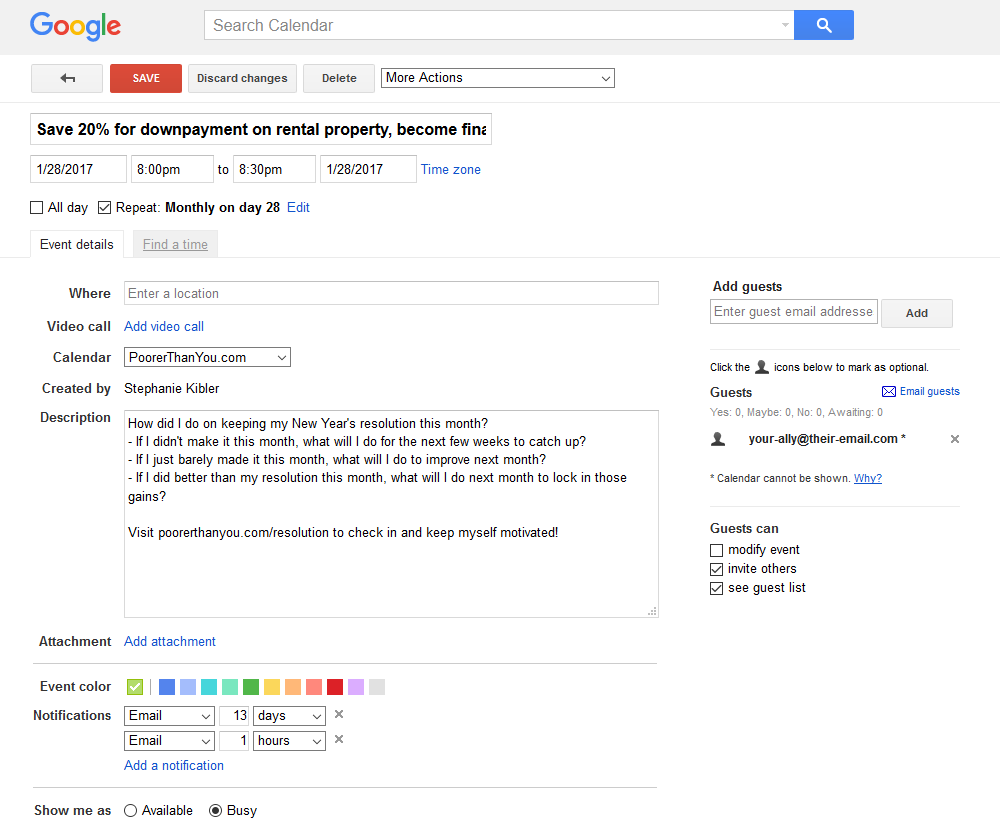
Most New Year’s resolutions fail. You probably don’t need fancy statistics to tell you that, but fancy statistics on the failure rate of New Year’s resolutions do exist, and they’re quite fascinating. According to a University of Scranton Journal of Clinical Psychology study:
- Only 8% of people are successful in achieving their resolution (that’s a 92% failure rate!)
- 24% of people never succeed and fail on their resolution each year
- 75% of resolutions are maintained through the first week (meaning 25% don’t even make it that long)
There’s good news in the report, though. For instance, 39% of people in their twenties achieve their resolutions each year, vs. only 14% of people in their 50s. So as millennials, we’ve got an advantage over older folks trying to make resolutions stick. But, aside from finding the Fountain of Youth, is there anything you can do to make sure you don’t screw up and fail at your resolutions? Yes. Yes, there is.
Resolutions Should Be Strategies, Not Goals
Here are some New Year’s resolutions that don’t work:
- I resolve to get in shape this year.
- I resolve to fix my finances this year.
- I resolve to be less of an asshole this year.
It’s not that these are bad things to try and achieve, it’s that they’re goals – not strategies. They’re nebulous, amorphous blobs that tell us nothing about what you’re going to actually do. It’s the strategy that’s your resolution; a goal is not a resolution.
But You Still Need a Goal
Sometimes, people go too far in the other direction. They resolve to do something just because they think they’re “supposed to.” So then it looks like this:
- I resolve to go to the gym 3 times a week this year.
- I resolve to save 20% of my income this year.
- I resolve to smile at everyone I see this year.
These are good strategies, and they make for good resolutions. Except… they’re not motivating. They fall kinda flat. Why are you doing the thing? What do you hope to achieve?
Only by combining the two things – a strategic resolution with a loftier goal in mind, do you get a good, solid resolution you can stick to:
- I resolve to go to the gym 3 times per week this year, to lose 10 pounds and build muscle, in order to live a longer, healthier life.
- I resolve to save 20% of my income, putting it into a savings account until I have a 3 month emergency fund, then putting the rest into a Roth IRA, so that I can retire by age 55.
- I resolve to smile at everyone I see this year, and take 10 minutes each day to practice deliberate empathy, so that I will become a nicer person and Gary will stop calling me “an asshole” all the time.
Don’t spend too much time working on your goal and strategies. You don’t want to get bogged down feeling like you don’t have a “good enough” goal or strategy. You want to get to work right away, so just write something down and start working on it. You can always change the plan later… but only if you have a plan in the first place.
Recruit Allies and Mentors
Allies
The self-improvement game SuperBetter encourages players to think of themselves as a superhero, and to recruit a superhero squad to help them achieve their goals. You’re looking for the Alfred to your Batman, the Scooby Gang to your Buffy, the X-Men to your Wolverine. People who you look up to, people you don’t want to disappoint, and people who will be supportive and encouraging… while still giving you a good kick in the ass, if you need it.
Ask at least one person to be your “ally” by helping you stick to your New Year’s resolution. Don’t worry about feeling silly – the truth is, most people are flattered to be asked!
If you don’t have a good support system in your life (your friends and family suck), it’s okay to find an ally on the internet instead. There are online forums for people looking for allies in SuperBetter. If your resolution is financial, I run the Financial Discipline guild on the to-do list game service Habitica, which is full of helpful people. Find a tribe of like-minded people and recruit some allies!
Mentors
People in your personal life who can keep you motivated are good and necessary, but you also need someone to learn from. Chances are, you already know someone who’s done what you hope to achieve. Or at least, you know someone who’s better at the thing than you are. Find that person, talk to them, ask them how they got good at the thing. The truth is, most people aren’t born with an ingrained talent for going to the gym/saving money/not being a dick – it’s something they worked at. And you can learn from how they got started, and what they did to stick with it.
Just like with your allies, real-life mentors are best, but if you truly don’t have someone to emulate in your own life, you can turn to the internet for mentors. But it’s not enough to just read someone’s book or blog – you need to reach out, send an email/message/Skype invite, and get a one-on-one conversation going. Otherwise, what you have is not a mentor, it’s just someone who’s entertaining you a bit.
Announce Your Resolution On Social Media. Or, Don’t.
There are two schools of thought here:
- Putting your resolution on social media creates accountability. Now, everyone knows what you’re working on, and they’ll know if you fail. To avoid judgement for failing, you’ll work harder to keep your resolution.
- Putting your resolution on social media generates praise just for having made the resolution. Your brain, having already achieved the praise it seeks just for posting, doesn’t feel the need to actually work on your resolution. It got what it needed, you feel like you did something productive, and now you’ll just put your feet up and relax without actually doing the thing.
There’s evidence for both sides of this argument, so it’s not a cut-and-dried black-and-white answer. The research article “When Intentions Go Public” provided strong evidence for scenario #2, finding that study participants who had their intentions acknowledged by a researcher spent less time on a task and were less likely to complete it. So it’s the praise, the acknowledgement, that devious little “Like” counter that kills our motivation to work on the thing.
I can offer anecdotal evidence for scenario #1: this blog. I’ve been publishing my goals, strategies, and my net worth updates on here for 10 years, and having it all out there publicly has created a certain amount of accountability. I know if I mess up, you will all see my failures.
But I’ve been called to task on this. In his book Predictably Irrational, Dan Ariely said of my blog and others like it: “Blogging about overspending is important and useful, but … what we truly need is a method to curb our consumption at the moment of temptation, rather than a way to complain about it after the fact.”
Indeed, the answer is: don’t put your resolution on social media unless you are also going to provide frequent updates on your successes and your failures. You need to get the praise when you’ve actually done something – not just for setting the goal. And in order to get the benefit of accountability, you need to fess up when you screw up.
If you’re not willing to make posts about your wins and your losses, then keep your resolution to yourself (and your allies and your mentors, of course).
Set Yourself Up for Several Small Wins Early On
In yet another example of researchers proving me wrong, the Harvard Business Review recently published some research that showed that paying off debts starting with the smallest ones first was more motivating than paying them off in order of interest rate, or consolidating them into one lower-interest debt. They attributed this phenomena to the “power of small wins” – the idea that getting several small wins early in the game is incredibly motivating.
I still stick by my idea that paying off debts in order of interest rate is motivating to people like me who love cold, hard numbers… but I can’t argue with the principle that small wins create motivation. That’s why, when I was paying off my credit card, I used an insane spreadsheet to track every single purchase I was paying off, as I paid them off. This created a series of small wins for me, as I was able to say “today I paid off that camera, and that Blockbuster rental!” (Yes, there were still Blockbusters 10 years ago when I was paying off my credit card. #FeelinOld.)
Okay, so what if your resolution has nothing to do with paying off credit card debt? You can still set yourself up for small wins, as soon as possible. You just have to figure out what that means for your particular resolution. Is it going to the gym and running faster and longer than the old guy on the next treadmill? Is it using an app like Digit or Acorns to save or invest small amounts from your checking account? Is it using a savings challenge to save $1 this week, $2 next week, and so on? Is it sending a nice card to your grandma?
It doesn’t matter how small the win is, as long as it’s some sort of a win that’s intrinsically tied to your resolution, and you get that small win now. Set up a series of them to happen rapid fire over the next few weeks, and you’ll be motivated to keep getting that endorphin rush all through the year.
Make a Follow-Up Appointment with Yourself
Open up Google Calendar. Right now. (Or whatever calendar app you’re using. IDGAF.)
Make an event for January 28th. Don’t make it an “all-day” event – pick a specific time. “8pm on January 28th” or whatever, for 30 minutes.
Name the event with the name of your resolution and goal. “Save 20% for a house down payment.” “Go to the gym 3 times/week, lose 15 pounds.” “Be nice, don’t get kicked in the balls.”
Set the event to repeat each month on the 28th. Why not the 31st? Because months with fewer than 31 days seem to screw up Google Calendar’s “repeat on this day of the month” function. (I’m looking at you, February.)
 In the description box, paste the following:
In the description box, paste the following:
How did I do on keeping my New Year’s resolution this month?
– If I didn’t make it this month, what will I do for the next few weeks to catch up?
– If I just barely made it this month, what will I do to improve next month?
– If I did better than my resolution this month, what will I do next month to lock in those gains?
Visit poorerthanyou.com/resolution/ to check in and keep myself motivated!
Now, click “Add a notification.” Make a notification to email you 13 days before the event. This will give you a little reminder on the 15th of the month that your check-in is coming. Add a second notification to email you 1 hour before the event, to remind you to do it. For bonus points, make sure you log in on your smartphone and set up a notification there, too.
Under “Add guests,” add the email address of your best ally. They don’t need to sit down with you for the check-in, but they should contact you after the fact and ask how it went. (Make sure you, uh, tell them this, so they don’t just get a confusing calendar invite and not know what do with it.)
There. Now you’re all set… so long as you actually keep the appointment and ask yourself those questions every month. Reschedule the event if it conflicts with your other plans on a certain month, but make sure you keep it. You set the appointment for the 28th of the month instead of the last day, giving you a little wiggle room to reschedule, if you need it.
So what if most New Year’s resolutions fail? Put this advice into action, and yours won’t.
What do you say? Share your New Year’s resolution in the comments. Don’t worry, there’s no “Like” button for comments here, so you won’t get praise just for sharing that will throw you off your game. 😉 But if you come back and check in throughout the year, you will get that motivating accountability we talked about!
Photo credit: Jerry Kiesewetter
